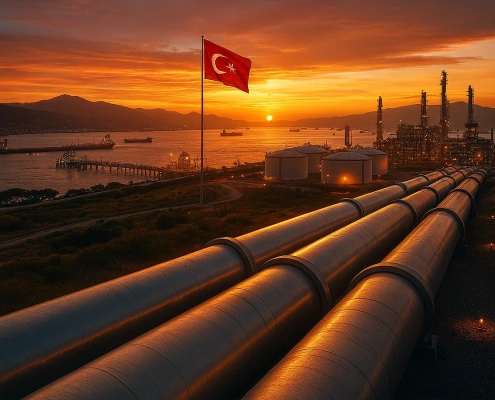 Turkey’s Strategic Position in Global Energy Trade
Turkey’s Strategic Position in Global Energy Trade
Turkey has emerged as one of the most critical energy hubs in the world, strategically positioned at the crossroads of Europe, Asia, and the Middle East. With its unique geographic location, robust infrastructure, and growing industrial capacity, Turkey plays an essential role in global energy security and international trade logistics.
As global demand for oil, natural gas, petrochemicals, and refined products continues to rise, Turkey’s position as an energy corridor has become increasingly vital for both suppliers and buyers across multiple continents.
Why Turkey is a Key Energy Hub
Turkey’s geographic advantage offers unparalleled access to major energy-producing and energy-consuming regions:
- Proximity to Energy Producers: Turkey borders major oil and gas producers including Russia, Iran, Iraq, and Azerbaijan, providing direct access to Caspian and Middle Eastern energy reserves.
- Gateway to European Markets: With established pipeline networks and maritime routes, Turkey serves as the primary transit route for energy supplies heading to Europe.
- Access to Asian Markets: Through the Mediterranean and Black Sea ports, Turkish infrastructure connects Middle Eastern and Russian energy resources to growing Asian markets.
- Political Stability in Transit: Turkey’s developed legal framework and investment-friendly policies support long-term energy trade agreements and infrastructure projects.
Major Energy Corridors Passing Through Turkey
Turkey hosts several internationally significant energy transit routes:
Natural Gas Pipelines:
- TurkStream Pipeline: Transports Russian natural gas to Turkey and Southern Europe via the Black Sea.
- Trans-Anatolian Natural Gas Pipeline (TANAP): Delivers Azerbaijani gas from the Caspian region to Europe through Turkey.
- Blue Stream Pipeline: Supplies natural gas from Russia directly to Turkey under the Black Sea.
Oil Transit Routes:
- Baku-Tbilisi-Ceyhan (BTC) Pipeline: One of the world’s longest oil pipelines, transporting Caspian crude oil to global markets via Turkey’s Mediterranean coast.
- Kirkuk-Ceyhan Pipeline: Carries Iraqi crude oil to international markets through Turkish export terminals.
Maritime Energy Routes:
- The Turkish Straits (Bosporus and Dardanelles) are critical chokepoints for oil tankers transporting Russian and Caspian oil to global markets.
- Major Turkish ports including Ceyhan, Mersin, and Aliağa serve as key loading and distribution points for refined petroleum products and LNG.
Turkey’s Role in Petrochemical and Chemical Trade
Beyond crude oil and natural gas, Turkey has developed a strong petrochemical industry that supports regional chemical supply chains:
- Domestic Refineries: Turkey operates multiple modern refineries with a combined capacity exceeding 600,000 barrels per day, producing gasoline, diesel, jet fuel, and petrochemical feedstocks.
- Chemical Manufacturing Hub: Turkey produces and exports a wide range of industrial chemicals including Caustic Soda (NaOH), Sulfuric Acid, Polymers, and Solvents to Europe, the Middle East, and North Africa.
- Strategic Chemical Suppliers: Companies like Eurasia Petrol leverage Turkey’s logistical advantages to supply high-purity industrial chemicals and petroleum products to global markets with competitive pricing and reliable delivery.
Infrastructure and Logistics Advantages
Turkey’s energy trade success is supported by world-class infrastructure:
- Modern Port Facilities: Deep-water ports equipped for handling crude oil, LNG, LPG, and bulk chemicals.
- Extensive Pipeline Network: Integrated pipeline systems connecting production regions to export terminals.
- Free Trade Zones: Multiple free zones offering customs benefits, tax incentives, and streamlined logistics for energy traders.
- Rail and Road Networks: Well-developed land transport infrastructure connecting Turkey to neighboring countries and European markets.
Economic and Geopolitical Implications
Turkey’s strategic energy position provides significant economic and geopolitical benefits:
- Energy Security for Europe: Turkey reduces Europe’s dependence on single-source energy suppliers by diversifying transit routes.
- Revenue from Transit Fees: Energy transit generates substantial income through pipeline fees, port services, and logistics operations.
- Regional Influence: Control over critical energy corridors enhances Turkey’s diplomatic leverage in international energy negotiations.
- Industrial Growth: Domestic access to diverse energy sources supports Turkey’s manufacturing and export sectors.
Future Outlook: Turkey’s Expanding Role in Energy Transition
As the global energy landscape shifts toward renewable energy and hydrogen, Turkey is positioning itself for future opportunities:
- Green Hydrogen Production: Plans for large-scale hydrogen production facilities leveraging renewable energy resources.
- Renewable Energy Exports: Potential to export solar and wind energy to Europe via undersea power cables.
- LNG Hub Development: Expansion of LNG import and re-export facilities to serve as a regional LNG trading hub.
- Sustainable Chemical Production: Growing focus on eco-friendly chemical manufacturing aligned with EU sustainability standards.

Eurasia Petrol: Connecting Global Markets Through Turkey
As part of Turkey’s thriving energy trade ecosystem, Eurasia Petrol provides reliable access to petroleum products, industrial chemicals, and petrochemical materials. With strategic sourcing from Turkish and regional producers, comprehensive quality control, and export-ready logistics, Eurasia Petrol serves industries across Europe, Asia, and the Middle East.
Whether you need Caustic Soda (NaOH), Base Oil, Solvents, Polymers, or other industrial chemicals, Eurasia Petrol ensures consistent supply, competitive pricing, and timely delivery from Turkey’s strategic energy hub.
Conclusion
Turkey’s unmatched geographic position, advanced infrastructure, and growing industrial capacity make it an indispensable player in global energy trade. As energy demand continues to evolve and new trade routes emerge, Turkey will remain a critical bridge connecting energy producers and consumers across continents.
For businesses seeking reliable chemical and petroleum product suppliers with strategic advantages, Turkey — and trusted partners like Eurasia Petrol — offer unparalleled access to global markets.
 Turkey’s Strategic Position in Global Energy Trade
Turkey’s Strategic Position in Global Energy Trade

 LDPE: A Key Material Powering Modern Packaging and Industrial Applications
LDPE: A Key Material Powering Modern Packaging and Industrial Applications